Comprehensive Analysis of Contract, Property, and Tort Law in Business
VerifiedAdded on 2022/09/11
|6
|1536
|10
Report
AI Summary
This report provides a comprehensive analysis of key legal principles relevant to business operations, drawing upon New Zealand's legal framework. It begins with an overview of the sources of New Zealand's constitution, including the Prerogative powers of the Queen, the Treaty of Waitangi, the Bill of Rights Act, and other essential statutes. The report then delves into contract law, addressing issues such as hire purchase agreements, breach of contract, and contract frustration, as well as the Sale of Goods Act. Furthermore, it examines property law, including the passing of property and ownership rights. The report also covers tort law, specifically the tort of negligence, analyzing elements such as duty of care, breach of duty, and causation, and vicarious liability. Finally, the report touches upon property rights, distinguishing between possession and ownership, and the application of the Land Transfer Act. The assignment provides a detailed exploration of these legal concepts, supported by relevant case law and statutory provisions.
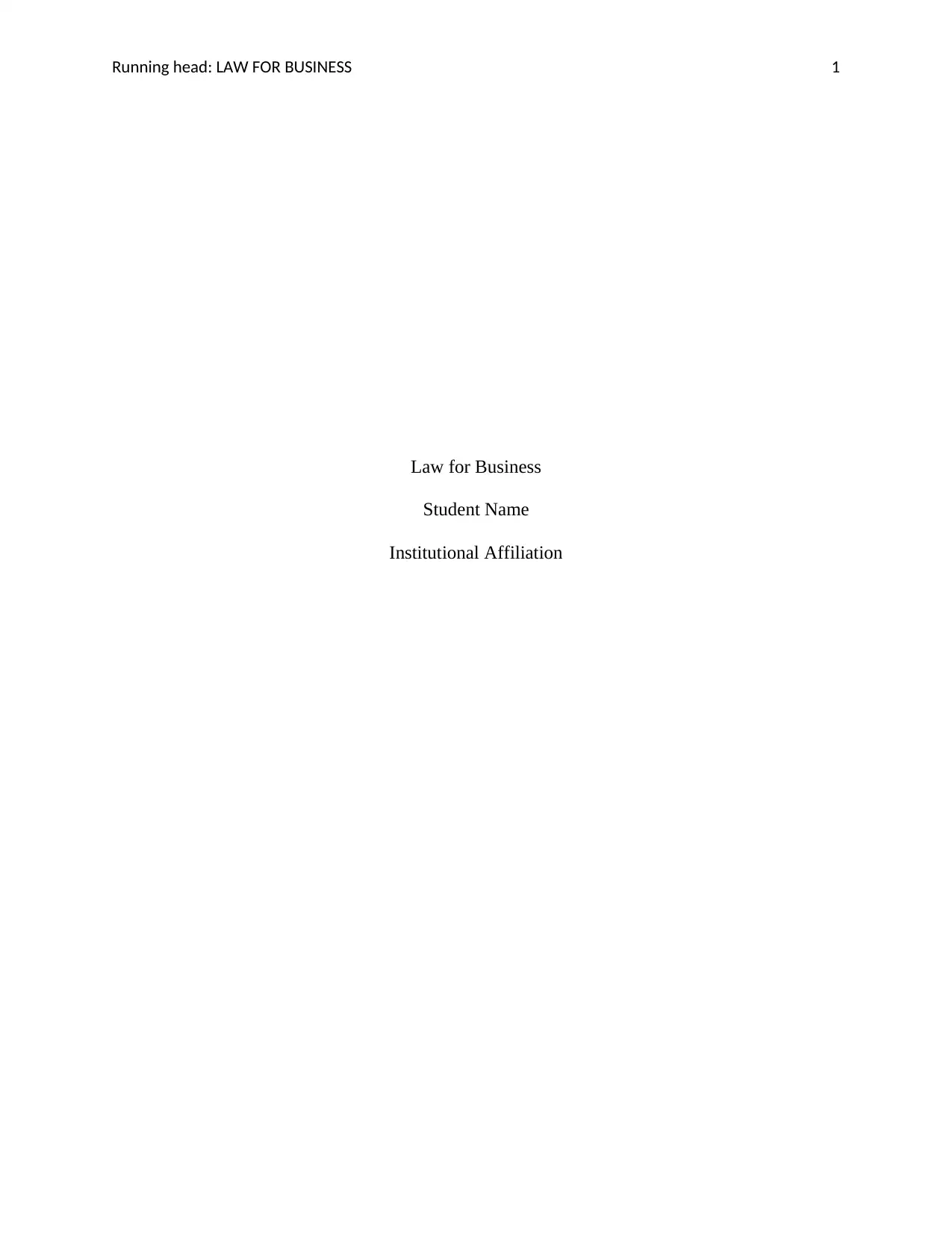
Running head: LAW FOR BUSINESS 1
Law for Business
Student Name
Institutional Affiliation
Law for Business
Student Name
Institutional Affiliation
Paraphrase This Document
Need a fresh take? Get an instant paraphrase of this document with our AI Paraphraser
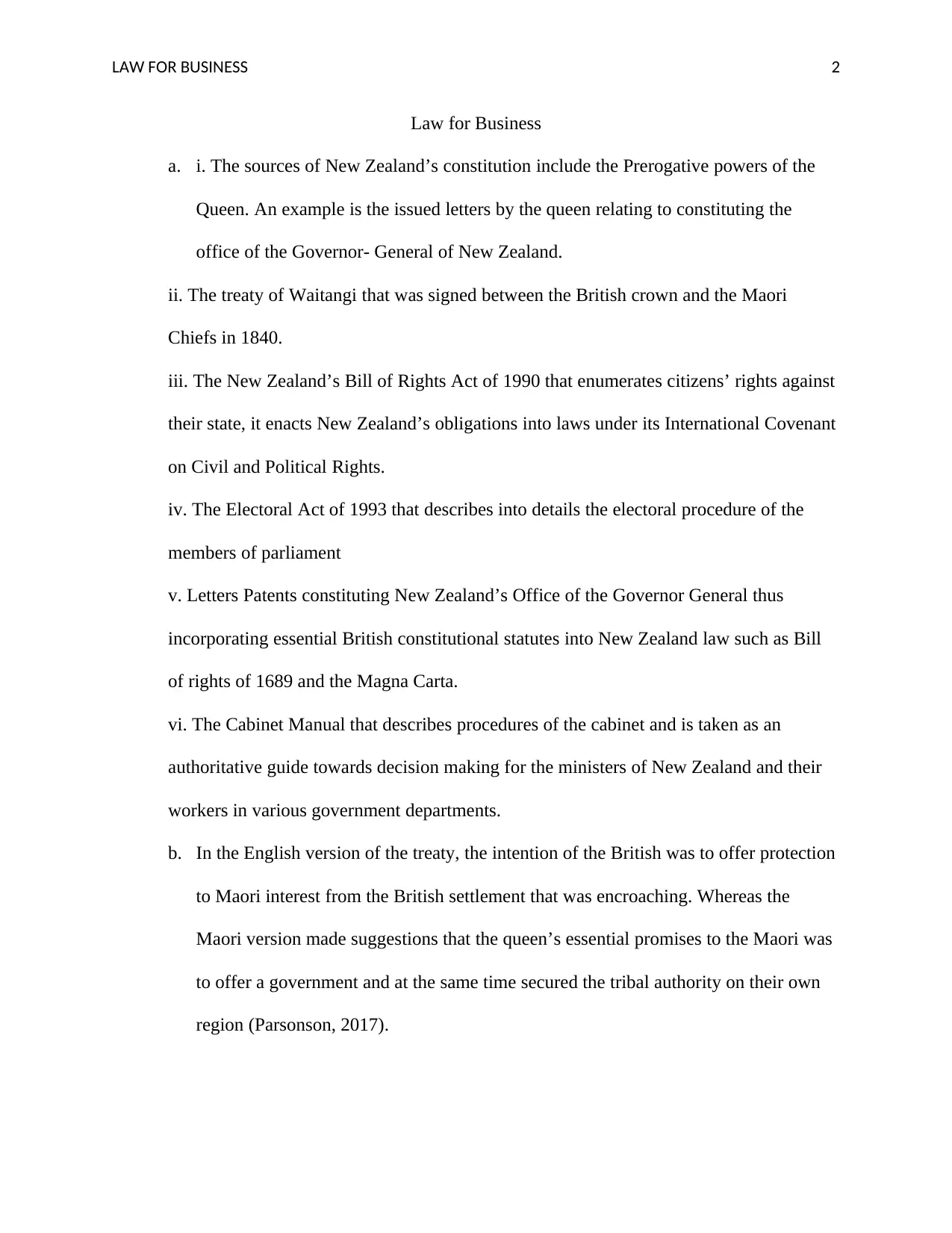
LAW FOR BUSINESS 2
Law for Business
a. i. The sources of New Zealand’s constitution include the Prerogative powers of the
Queen. An example is the issued letters by the queen relating to constituting the
office of the Governor- General of New Zealand.
ii. The treaty of Waitangi that was signed between the British crown and the Maori
Chiefs in 1840.
iii. The New Zealand’s Bill of Rights Act of 1990 that enumerates citizens’ rights against
their state, it enacts New Zealand’s obligations into laws under its International Covenant
on Civil and Political Rights.
iv. The Electoral Act of 1993 that describes into details the electoral procedure of the
members of parliament
v. Letters Patents constituting New Zealand’s Office of the Governor General thus
incorporating essential British constitutional statutes into New Zealand law such as Bill
of rights of 1689 and the Magna Carta.
vi. The Cabinet Manual that describes procedures of the cabinet and is taken as an
authoritative guide towards decision making for the ministers of New Zealand and their
workers in various government departments.
b. In the English version of the treaty, the intention of the British was to offer protection
to Maori interest from the British settlement that was encroaching. Whereas the
Maori version made suggestions that the queen’s essential promises to the Maori was
to offer a government and at the same time secured the tribal authority on their own
region (Parsonson, 2017).
Law for Business
a. i. The sources of New Zealand’s constitution include the Prerogative powers of the
Queen. An example is the issued letters by the queen relating to constituting the
office of the Governor- General of New Zealand.
ii. The treaty of Waitangi that was signed between the British crown and the Maori
Chiefs in 1840.
iii. The New Zealand’s Bill of Rights Act of 1990 that enumerates citizens’ rights against
their state, it enacts New Zealand’s obligations into laws under its International Covenant
on Civil and Political Rights.
iv. The Electoral Act of 1993 that describes into details the electoral procedure of the
members of parliament
v. Letters Patents constituting New Zealand’s Office of the Governor General thus
incorporating essential British constitutional statutes into New Zealand law such as Bill
of rights of 1689 and the Magna Carta.
vi. The Cabinet Manual that describes procedures of the cabinet and is taken as an
authoritative guide towards decision making for the ministers of New Zealand and their
workers in various government departments.
b. In the English version of the treaty, the intention of the British was to offer protection
to Maori interest from the British settlement that was encroaching. Whereas the
Maori version made suggestions that the queen’s essential promises to the Maori was
to offer a government and at the same time secured the tribal authority on their own
region (Parsonson, 2017).
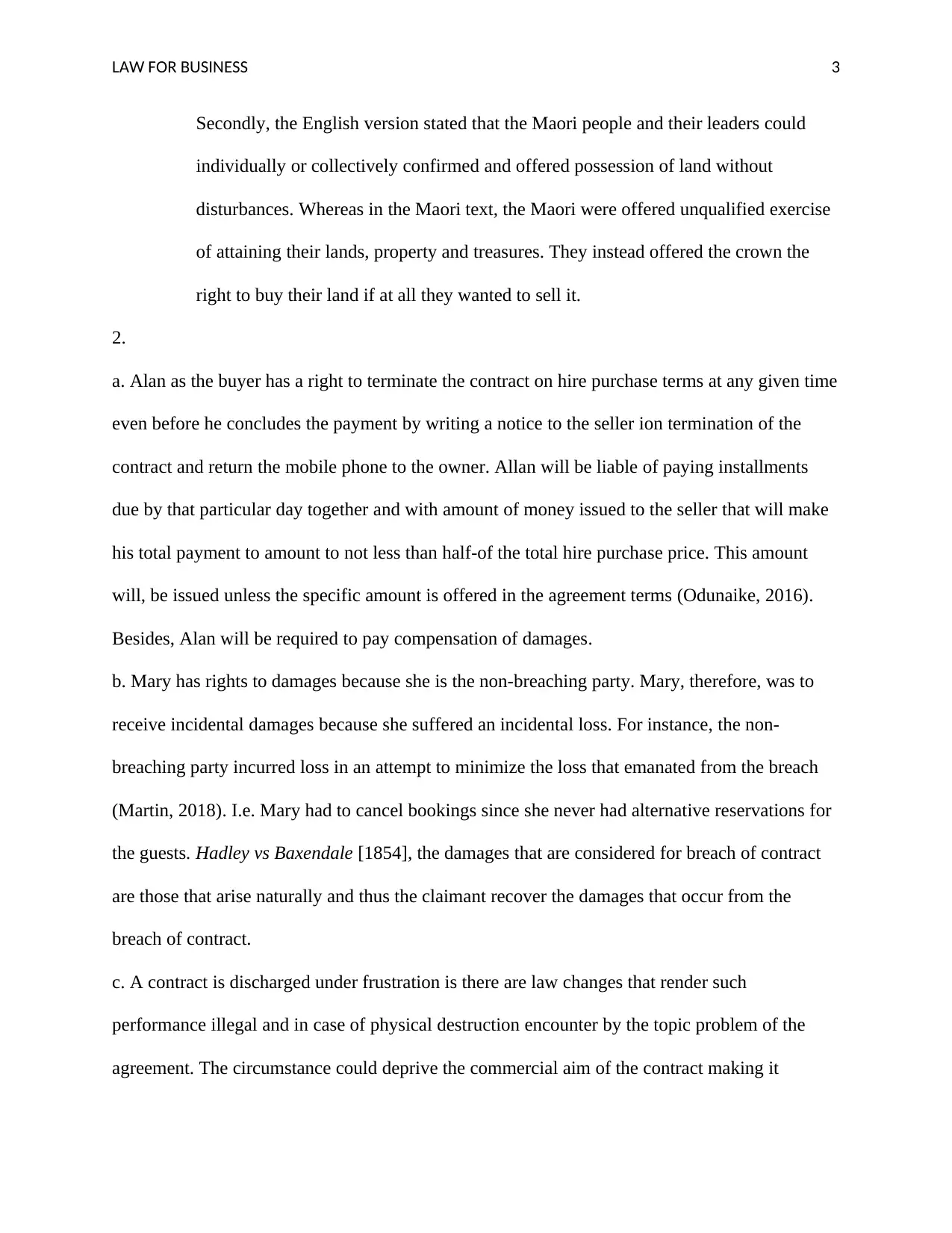
LAW FOR BUSINESS 3
Secondly, the English version stated that the Maori people and their leaders could
individually or collectively confirmed and offered possession of land without
disturbances. Whereas in the Maori text, the Maori were offered unqualified exercise
of attaining their lands, property and treasures. They instead offered the crown the
right to buy their land if at all they wanted to sell it.
2.
a. Alan as the buyer has a right to terminate the contract on hire purchase terms at any given time
even before he concludes the payment by writing a notice to the seller ion termination of the
contract and return the mobile phone to the owner. Allan will be liable of paying installments
due by that particular day together and with amount of money issued to the seller that will make
his total payment to amount to not less than half-of the total hire purchase price. This amount
will, be issued unless the specific amount is offered in the agreement terms (Odunaike, 2016).
Besides, Alan will be required to pay compensation of damages.
b. Mary has rights to damages because she is the non-breaching party. Mary, therefore, was to
receive incidental damages because she suffered an incidental loss. For instance, the non-
breaching party incurred loss in an attempt to minimize the loss that emanated from the breach
(Martin, 2018). I.e. Mary had to cancel bookings since she never had alternative reservations for
the guests. Hadley vs Baxendale [1854], the damages that are considered for breach of contract
are those that arise naturally and thus the claimant recover the damages that occur from the
breach of contract.
c. A contract is discharged under frustration is there are law changes that render such
performance illegal and in case of physical destruction encounter by the topic problem of the
agreement. The circumstance could deprive the commercial aim of the contract making it
Secondly, the English version stated that the Maori people and their leaders could
individually or collectively confirmed and offered possession of land without
disturbances. Whereas in the Maori text, the Maori were offered unqualified exercise
of attaining their lands, property and treasures. They instead offered the crown the
right to buy their land if at all they wanted to sell it.
2.
a. Alan as the buyer has a right to terminate the contract on hire purchase terms at any given time
even before he concludes the payment by writing a notice to the seller ion termination of the
contract and return the mobile phone to the owner. Allan will be liable of paying installments
due by that particular day together and with amount of money issued to the seller that will make
his total payment to amount to not less than half-of the total hire purchase price. This amount
will, be issued unless the specific amount is offered in the agreement terms (Odunaike, 2016).
Besides, Alan will be required to pay compensation of damages.
b. Mary has rights to damages because she is the non-breaching party. Mary, therefore, was to
receive incidental damages because she suffered an incidental loss. For instance, the non-
breaching party incurred loss in an attempt to minimize the loss that emanated from the breach
(Martin, 2018). I.e. Mary had to cancel bookings since she never had alternative reservations for
the guests. Hadley vs Baxendale [1854], the damages that are considered for breach of contract
are those that arise naturally and thus the claimant recover the damages that occur from the
breach of contract.
c. A contract is discharged under frustration is there are law changes that render such
performance illegal and in case of physical destruction encounter by the topic problem of the
agreement. The circumstance could deprive the commercial aim of the contract making it
⊘ This is a preview!⊘
Do you want full access?
Subscribe today to unlock all pages.

Trusted by 1+ million students worldwide
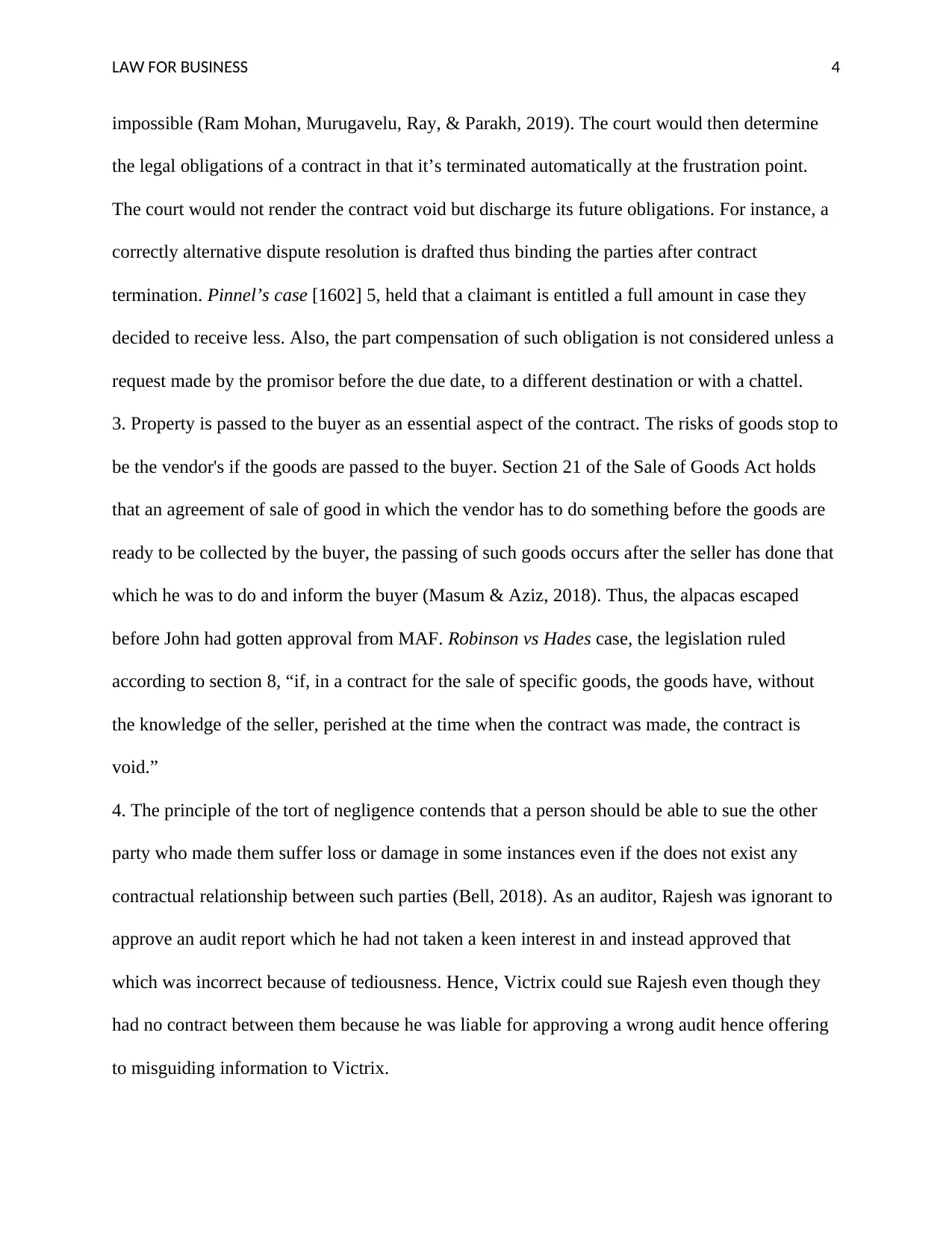
LAW FOR BUSINESS 4
impossible (Ram Mohan, Murugavelu, Ray, & Parakh, 2019). The court would then determine
the legal obligations of a contract in that it’s terminated automatically at the frustration point.
The court would not render the contract void but discharge its future obligations. For instance, a
correctly alternative dispute resolution is drafted thus binding the parties after contract
termination. Pinnel’s case [1602] 5, held that a claimant is entitled a full amount in case they
decided to receive less. Also, the part compensation of such obligation is not considered unless a
request made by the promisor before the due date, to a different destination or with a chattel.
3. Property is passed to the buyer as an essential aspect of the contract. The risks of goods stop to
be the vendor's if the goods are passed to the buyer. Section 21 of the Sale of Goods Act holds
that an agreement of sale of good in which the vendor has to do something before the goods are
ready to be collected by the buyer, the passing of such goods occurs after the seller has done that
which he was to do and inform the buyer (Masum & Aziz, 2018). Thus, the alpacas escaped
before John had gotten approval from MAF. Robinson vs Hades case, the legislation ruled
according to section 8, “if, in a contract for the sale of specific goods, the goods have, without
the knowledge of the seller, perished at the time when the contract was made, the contract is
void.”
4. The principle of the tort of negligence contends that a person should be able to sue the other
party who made them suffer loss or damage in some instances even if the does not exist any
contractual relationship between such parties (Bell, 2018). As an auditor, Rajesh was ignorant to
approve an audit report which he had not taken a keen interest in and instead approved that
which was incorrect because of tediousness. Hence, Victrix could sue Rajesh even though they
had no contract between them because he was liable for approving a wrong audit hence offering
to misguiding information to Victrix.
impossible (Ram Mohan, Murugavelu, Ray, & Parakh, 2019). The court would then determine
the legal obligations of a contract in that it’s terminated automatically at the frustration point.
The court would not render the contract void but discharge its future obligations. For instance, a
correctly alternative dispute resolution is drafted thus binding the parties after contract
termination. Pinnel’s case [1602] 5, held that a claimant is entitled a full amount in case they
decided to receive less. Also, the part compensation of such obligation is not considered unless a
request made by the promisor before the due date, to a different destination or with a chattel.
3. Property is passed to the buyer as an essential aspect of the contract. The risks of goods stop to
be the vendor's if the goods are passed to the buyer. Section 21 of the Sale of Goods Act holds
that an agreement of sale of good in which the vendor has to do something before the goods are
ready to be collected by the buyer, the passing of such goods occurs after the seller has done that
which he was to do and inform the buyer (Masum & Aziz, 2018). Thus, the alpacas escaped
before John had gotten approval from MAF. Robinson vs Hades case, the legislation ruled
according to section 8, “if, in a contract for the sale of specific goods, the goods have, without
the knowledge of the seller, perished at the time when the contract was made, the contract is
void.”
4. The principle of the tort of negligence contends that a person should be able to sue the other
party who made them suffer loss or damage in some instances even if the does not exist any
contractual relationship between such parties (Bell, 2018). As an auditor, Rajesh was ignorant to
approve an audit report which he had not taken a keen interest in and instead approved that
which was incorrect because of tediousness. Hence, Victrix could sue Rajesh even though they
had no contract between them because he was liable for approving a wrong audit hence offering
to misguiding information to Victrix.
Paraphrase This Document
Need a fresh take? Get an instant paraphrase of this document with our AI Paraphraser
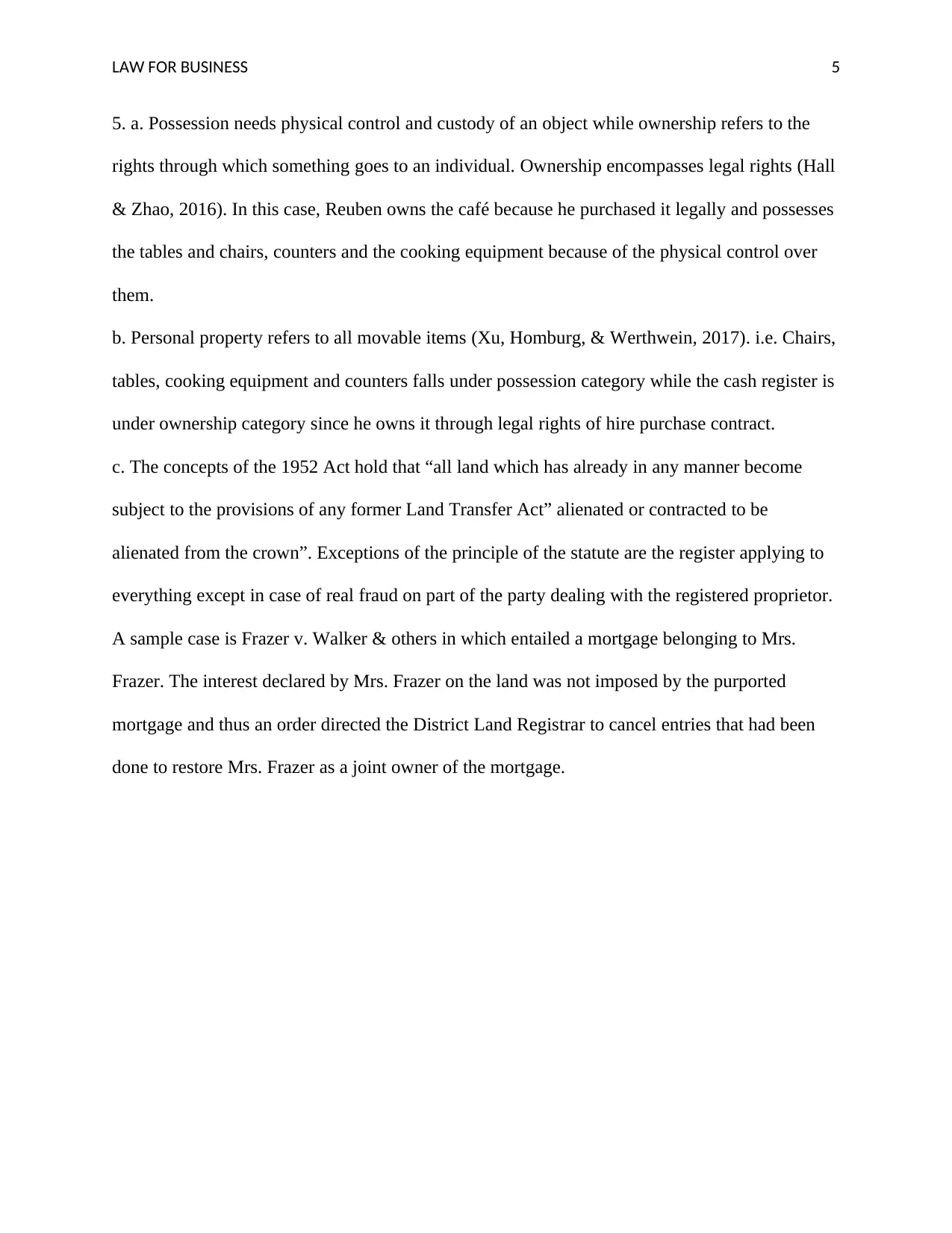
LAW FOR BUSINESS 5
5. a. Possession needs physical control and custody of an object while ownership refers to the
rights through which something goes to an individual. Ownership encompasses legal rights (Hall
& Zhao, 2016). In this case, Reuben owns the café because he purchased it legally and possesses
the tables and chairs, counters and the cooking equipment because of the physical control over
them.
b. Personal property refers to all movable items (Xu, Homburg, & Werthwein, 2017). i.e. Chairs,
tables, cooking equipment and counters falls under possession category while the cash register is
under ownership category since he owns it through legal rights of hire purchase contract.
c. The concepts of the 1952 Act hold that “all land which has already in any manner become
subject to the provisions of any former Land Transfer Act” alienated or contracted to be
alienated from the crown”. Exceptions of the principle of the statute are the register applying to
everything except in case of real fraud on part of the party dealing with the registered proprietor.
A sample case is Frazer v. Walker & others in which entailed a mortgage belonging to Mrs.
Frazer. The interest declared by Mrs. Frazer on the land was not imposed by the purported
mortgage and thus an order directed the District Land Registrar to cancel entries that had been
done to restore Mrs. Frazer as a joint owner of the mortgage.
5. a. Possession needs physical control and custody of an object while ownership refers to the
rights through which something goes to an individual. Ownership encompasses legal rights (Hall
& Zhao, 2016). In this case, Reuben owns the café because he purchased it legally and possesses
the tables and chairs, counters and the cooking equipment because of the physical control over
them.
b. Personal property refers to all movable items (Xu, Homburg, & Werthwein, 2017). i.e. Chairs,
tables, cooking equipment and counters falls under possession category while the cash register is
under ownership category since he owns it through legal rights of hire purchase contract.
c. The concepts of the 1952 Act hold that “all land which has already in any manner become
subject to the provisions of any former Land Transfer Act” alienated or contracted to be
alienated from the crown”. Exceptions of the principle of the statute are the register applying to
everything except in case of real fraud on part of the party dealing with the registered proprietor.
A sample case is Frazer v. Walker & others in which entailed a mortgage belonging to Mrs.
Frazer. The interest declared by Mrs. Frazer on the land was not imposed by the purported
mortgage and thus an order directed the District Land Registrar to cancel entries that had been
done to restore Mrs. Frazer as a joint owner of the mortgage.
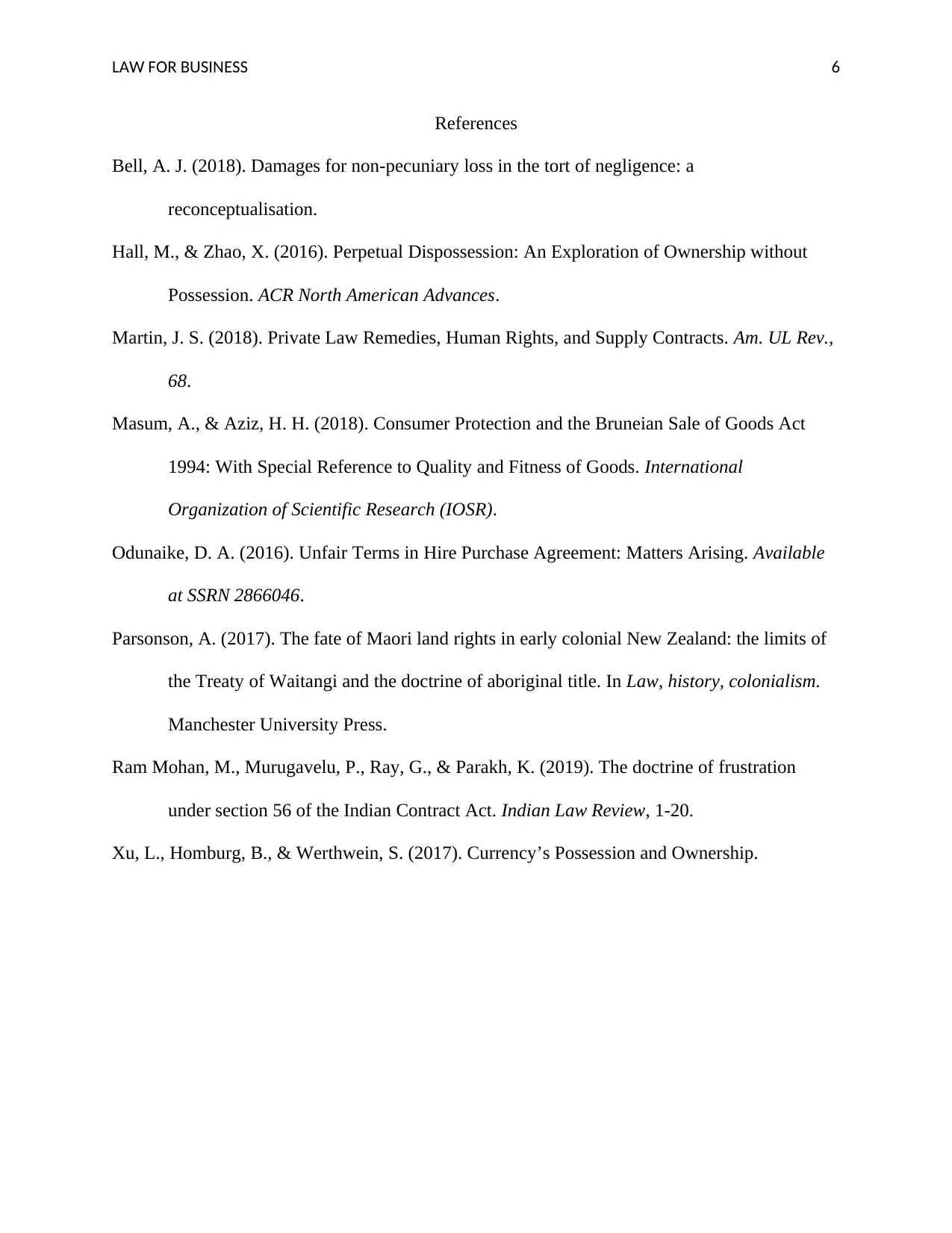
LAW FOR BUSINESS 6
References
Bell, A. J. (2018). Damages for non-pecuniary loss in the tort of negligence: a
reconceptualisation.
Hall, M., & Zhao, X. (2016). Perpetual Dispossession: An Exploration of Ownership without
Possession. ACR North American Advances.
Martin, J. S. (2018). Private Law Remedies, Human Rights, and Supply Contracts. Am. UL Rev.,
68.
Masum, A., & Aziz, H. H. (2018). Consumer Protection and the Bruneian Sale of Goods Act
1994: With Special Reference to Quality and Fitness of Goods. International
Organization of Scientific Research (IOSR).
Odunaike, D. A. (2016). Unfair Terms in Hire Purchase Agreement: Matters Arising. Available
at SSRN 2866046.
Parsonson, A. (2017). The fate of Maori land rights in early colonial New Zealand: the limits of
the Treaty of Waitangi and the doctrine of aboriginal title. In Law, history, colonialism.
Manchester University Press.
Ram Mohan, M., Murugavelu, P., Ray, G., & Parakh, K. (2019). The doctrine of frustration
under section 56 of the Indian Contract Act. Indian Law Review, 1-20.
Xu, L., Homburg, B., & Werthwein, S. (2017). Currency’s Possession and Ownership.
References
Bell, A. J. (2018). Damages for non-pecuniary loss in the tort of negligence: a
reconceptualisation.
Hall, M., & Zhao, X. (2016). Perpetual Dispossession: An Exploration of Ownership without
Possession. ACR North American Advances.
Martin, J. S. (2018). Private Law Remedies, Human Rights, and Supply Contracts. Am. UL Rev.,
68.
Masum, A., & Aziz, H. H. (2018). Consumer Protection and the Bruneian Sale of Goods Act
1994: With Special Reference to Quality and Fitness of Goods. International
Organization of Scientific Research (IOSR).
Odunaike, D. A. (2016). Unfair Terms in Hire Purchase Agreement: Matters Arising. Available
at SSRN 2866046.
Parsonson, A. (2017). The fate of Maori land rights in early colonial New Zealand: the limits of
the Treaty of Waitangi and the doctrine of aboriginal title. In Law, history, colonialism.
Manchester University Press.
Ram Mohan, M., Murugavelu, P., Ray, G., & Parakh, K. (2019). The doctrine of frustration
under section 56 of the Indian Contract Act. Indian Law Review, 1-20.
Xu, L., Homburg, B., & Werthwein, S. (2017). Currency’s Possession and Ownership.
⊘ This is a preview!⊘
Do you want full access?
Subscribe today to unlock all pages.

Trusted by 1+ million students worldwide
1 out of 6
Your All-in-One AI-Powered Toolkit for Academic Success.
+13062052269
info@desklib.com
Available 24*7 on WhatsApp / Email
![[object Object]](/_next/static/media/star-bottom.7253800d.svg)
Unlock your academic potential
Copyright © 2020–2026 A2Z Services. All Rights Reserved. Developed and managed by ZUCOL.
